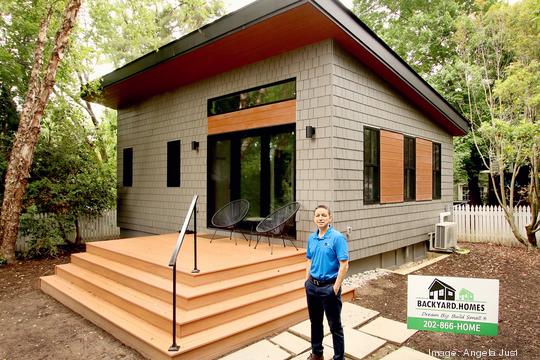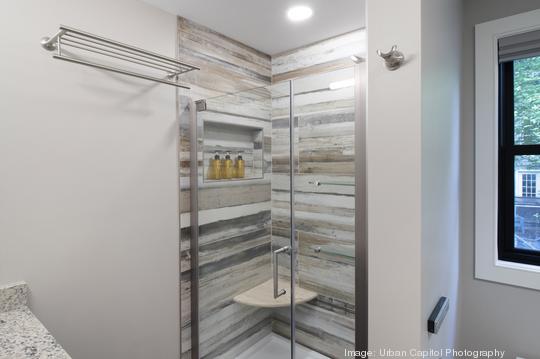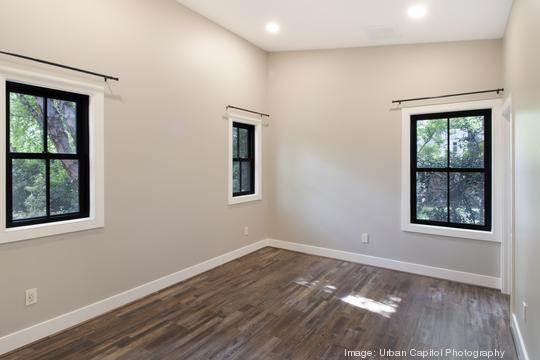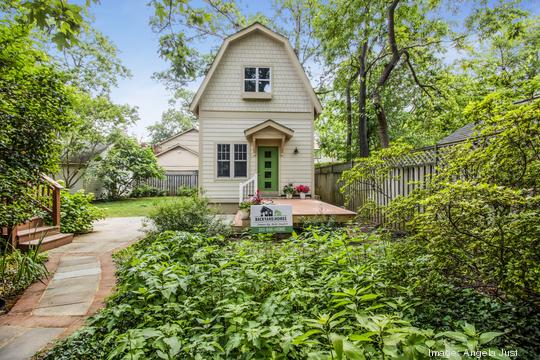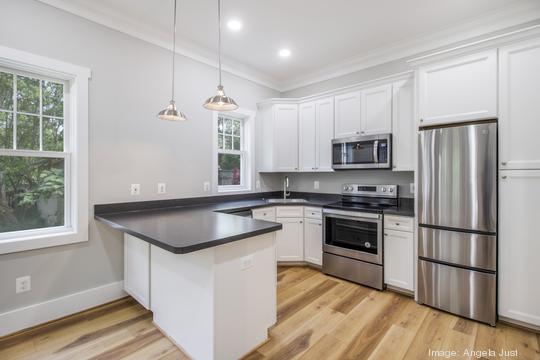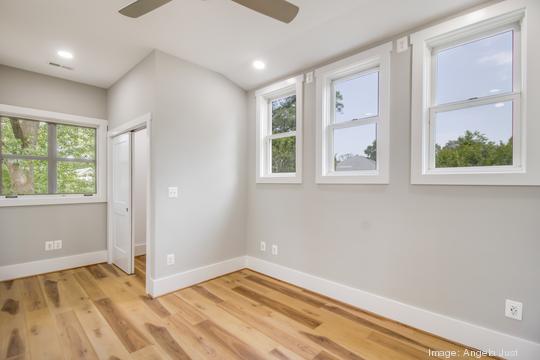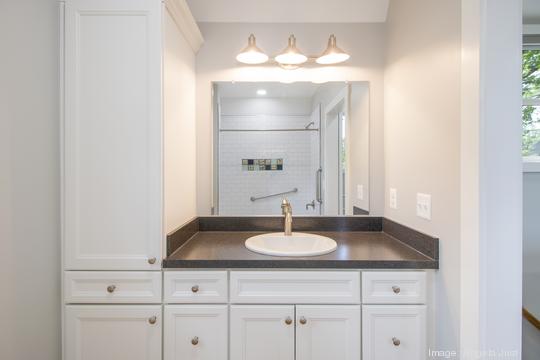About the business: Backyard Homes builds exactly what its name implies: small homes, known as accessory dwelling units, or ADUs, in backyards.
How it started: Michael Novotny didn’t need to leap into a new venture, having spent nearly two decades in real estate and development with the likes of Clark Construction, Vornado/Charles E. Smith, JBG Smith Properties and Penzance. He was well established, safe, in the corporate world.
“Most people try to downsize their lifestyle,” he said. “I downsized my career choice. Hopefully with some upside to it.”
He saw an opportunity, shortly after the Arlington County Board agreed in 2019 to allow ADUs countywide. By early 2020, he was stepping away from his full-time post, developing a business plan for Backyard Homes, and designing the 600-square-foot to 720-square-foot cottages that his new company would construct.
“It’s a very exciting, very compelling new type of housing,” Novotny said. “I wanted to be part of something that’s bigger than just building a new apartment building. This is being on a new frontier.”
He bootstrapped the business, which, while not getting into specific numbers, basically called for initial design costs, legal fees to draw up contracts, fees to build an online presence, software and licensing. He got his contractor’s license and a sales agent license.
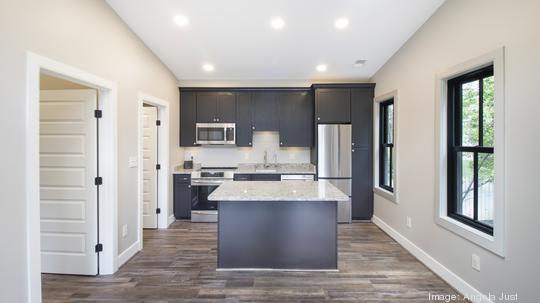
“The bigger cost is really sacrificing a year or more of income from my prior jobs,” he said, noting that’s where his wife, Molly, a senior land use planner at Cooley LLP, comes in. “We went from a dual-income household to a single-income household while the business was getting going, and it frankly still is,” he said.
A 600-square-foot cottage, Novotny said, is a far cry from the 300-unit buildings he was developing before, but “in some ways they actually solve some of the same problems.” Specifically, a lack of housing drives up housing prices: More homes brought to market, especially at a lower price point, addresses that issue at a macro level.
And then there’s the matter of actually getting the work done. An ADU, Novotny said, can go up in seven to eight months, including permit review, while an apartment building might take years.
“I feel like I can do more good in such a short window compared to what I had been doing, but using some of the same skills,” he said.
As for the buildings themselves — the base prefabricated model is essentially a one-bedroom condo with windows on all four sides, a full kitchen, full bath and laundry area. The homes feature spray foam insulation, Hardie siding, Marvin windows, Zip System wall sheathing, even skylights in some cases.
“I come from the corporate world, where if you didn’t produce a quality product, neighbors would be upset and the community would revolt,” he said.
The pandemic effect: Backyard Homes wasn’t affected by the pandemic as much as it was launched straight into it, in June 2020. Novotny was naturally nervous, as every business owner was, “but the pandemic has not hurt us.”
“The construction industry in general right now, it’s really in hyper drive,” he said. “I think it’s because people are home and realizing they need more space.”
The pandemic brought to light the issue of safely housing aging parents, Novotny said, and Backyard Homes could deliver a solution: “Why not live on the same property as your family in a safe environment?”
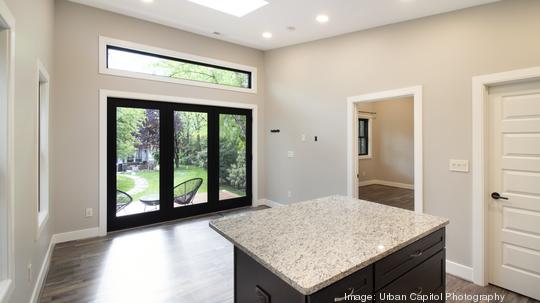
As of mid-May, Backyard Homes had delivered its first two buildings, both in Arlington, with a third under construction. Four more are in permit review, all in Montgomery County, which is also fairly new to the ADU party. Every customer so far, Novotny said, has wanted the cottage to house a family member, while retaining the option of renting it during periods of vacancy. But more are reaching out, he said, with questions about hosting an ADU simply for the purposes of generating income.
The units are priced between $175,000 and $225,000, plus the cost of site work and utilities. While he hasn’t done any jobs yet in D.C., which adopted an ADU-friendly policy in 2016, Novotny suggested it’ll probably be a little more expensive on that side of the Potomac.
The pandemic pivot: Novotny launched with two models of backyard homes. The pandemic inspired a third type: the office shed, a means to address the space crunch so many homeowners faced during the extended work-from-home period.
He took a model of a small home and downsized it further, to a single room. The first went to, of course, his wife.
“She is the recipient of the prototype office shed,” Novotny said. “She has the ‘she shed.’”
The challenge today: Novotny, a sole proprietor, partnered with a small builder to tackle each job, and so far, hasn’t faced staffing issues like so many other small businesses.
The challenge is the cost of materials. He’s constantly repricing homes as the availability of lumber, siding and roofing puts more pressure on pricing, sending it on a roller coaster. “It’s hard to quote someone today and then we have to go through the building permit — and to get the permit could take as much as three months,” he said. “And when you go to build it, the prices have moved.”
What’s next: Novotny didn’t go into this to stay as small as his homes. There’s a plan to grow Backyard Homes, and while he didn’t get too deep into specifics, he did offer an outline.
One is the potential to expand into other cities, likely through partnerships. Two is the “ship kit,” through which the parts of a Backyard Home are delivered to a homeowner elsewhere, and they hire their own local contractor to fabricate it. Three, Novotny said, is growing a rental portfolio of Backyard Homes. And four, a “franchise model that I think has a lot of potential.”
“I’m in it to build a very successful business right now,” he said. “I want to build it and see where it takes me.“
Email mneibauer@bizjournals.com to share your business with us.
